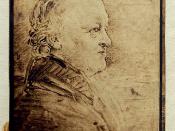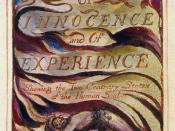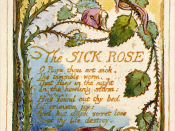William Blake's Songs of Innocence and Songs of Experience are presented as two opposing states respectively--that of innocence and that experience. Most of those represented in the Songs of Innocence can be paralleled, if not by title, by subject, to those in the Songs of Experience. There is "The Chimney Sweeper" and "Holy Thursday" in both books. To be paired with "The Tyger," is "The Lamb," and "The Blossom" with "The Sick Rose." These opposing states are indicated in the "Introduction" of The Songs of Innocence when the piper plays his melody twice. The first time he plays the boy laughs, the second time he weeps. The third time, when the piper sings, the boy weeps with joy. Here, the two contrasting conditions of innocence and experience are blended successfully.
Among the poems that don't blatantly have a mate is "To Tirzah." One might suggest that "To Tirzah" also is an example of the combination of the two types of songs.
The speaker rejects 'the fall,' or more, the woman responsible for making him a part of the mortal world, saying, "Then what have I to do with thee?" (5). Because of this woman, the speaker has a body and a defined sex that he also rejects.
"Whate'er is Born of Mortal Birth,
Must be consumed with the earth" (1-2).
Mortals are mortal and must eventually die. The speaker however, in rejecting all his mortality, will eventually be able to transcend, "To rise from Generation free" (3). When this happens, "It is a raised spiritual body," as seen in the matching plate.
It is evident that "To Tirzah" is subject to Blake's convictions regarding "the fall." His descriptions of mortality are grim to say the least. Blake does however, offer an alternative, to...



Short
This essay is too short but other than that it was alright
2 out of 2 people found this comment useful.